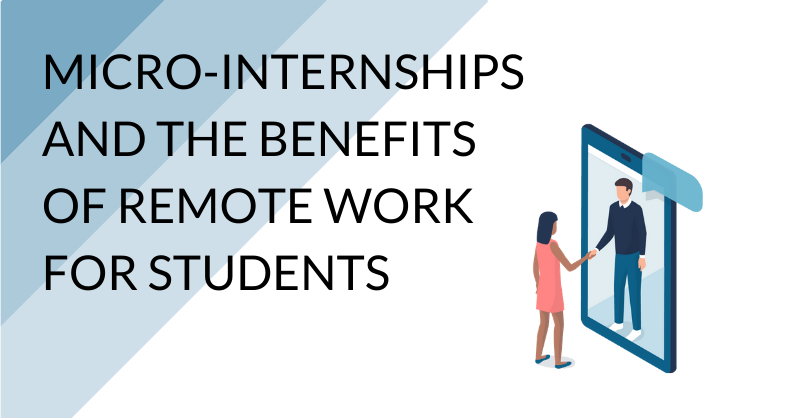
Micro-Internships and the Benefits of Remote Work for Students
As more companies embrace flexible working arrangements, Micro-Internships offer a new way to attract and engage college students. But what makes remote projects beneficial for students and your company?
Remote work opportunities for college students allow companies to recruit top talent regardless of geographic region, promote a work-life balance that students are accustomed to with online and blended learning, and cultivate a more diverse company culture.
How to Use Remote Work to Attract Top Talent for Your Company
While companies are on the hunt for the next wave of top talent, recent or soon-to-be grads are searching for online opportunities that fit into their jam-packed schedules. For a moment, put yourself in the shoes of a college student beginning their internship search:
After submitting your midterm through the online course portal, you log-in to attend a virtual info-session with a local tech firm. During the session you learn more about a career in digital marketing and that the company is looking for students to be onsite while they work independently to perform a competitor social media analysis. You’d love the experience but the commute will take you more time over the course of two weeks than the actual project. Do you feel like this company values your time?
Successful recruiting initiatives should model the types of individuals you want to attract. Many college students are hungry for work experience and they are highly motivated to demonstrate their skills through short-term opportunities. Remember that many students balance extracurricular activities, part-time jobs, athletics and even family responsibilities along with full course loads. They are used to working efficiently, they are ambitious, and they are tech-savvy. By encouraging college students to work with your team virtually as they finish school, you’re more likely to gain them as a full-time employee once they graduate.
Online Projects Help Attract Self-Starters
Virtual Micro-Internships naturally attract employees who take initiative, have aspirational career goals, and don’t need a lot of oversight. Moreover, online projects allow early-career talent to hone their communication skills and master time management. In fact, studies have shown that remote work can boost productivity by allowing team members to work more efficiently.
“Working remotely allowed me to improve my communication skills. I had to learn to communicate more than I normally would if I was working in person. This helped me determine what was important to say and to be very clear and direct in what I needed.”
- Micro-Intern on Parker Dewey
Virtual Work May Boost Productivity
College students are used to performing a constant balancing act, scrambling from classes to part-time jobs to extracurricular activities. They bring this same hustle mindset to the workplace. Virtual employees report that it is easier to concentrate on completing their projects. In addition:
- They don’t need extra time to commute into work.
- They can finish their work on their own schedule
- They aren’t distracted by their coworkers.
- They can take breaks when they need to.
- Their schedule is more flexible.
- They are more self-motivated.
Remote Micro-Internships Boost Diversity and Expand Talent Pools
By offering virtual Micro-Internships, you can recruit, interview, and hire interns from across the United States, not just those within driving distance. On Parker Dewey, students in any corner of the country—including those who don't have the same opportunities to connect with name-brand firms in the large metro areas—have the same access to these types of projects.
In addition to expanding geographic reach with remote opportunities, Micro-Internships alleviate travel and time constraints, which are two major barriers for low-income students that participate in traditional internships. Offering remote project opportunities removes these obstacles and allows students from diverse backgrounds to find the flexibility they need to complete assignments. With most students working on nights and weekends to meet the project deadline, they gain real-work experience without putting other responsibilities on-hold.
How to Ensure Success with Remote Micro-Interns
By this point in the consideration process,, you may be wondering “Will they actually get their work done?” Ensuring that you’re providing the same level of instruction, support, supervision and mentorship for a Micro-Intern as you would for a student in your office is critical. The most basic action a company can take is to have a “Student Remote Work Standards” agreement that both the intern and his or her manager are required to sign. This agreement would set forth the basic expectations and rules for working remotely. Virtual check-ins and progress calls are good methods to use to stay in touch with your intern. Be sure to also connect Micro-Interns with other team members and resources that can provide them with further information needed to complete their tasks.
Are Online Micro-Internships Right for Your Company?
Ultimately, when deciding whether or not to offer remote work for college students, further consider the types of candidates you are hiring. Current college students and recent graduates are ambitious, forward-thinking, and tech-savvy. By their very nature, top candidates are able to demonstrate their ability to get work done without someone looking over their shoulder. Also consider that you are not only drawing from high-achieving students within driving distance. Micro-Internships give you access to college students from around the United States.




